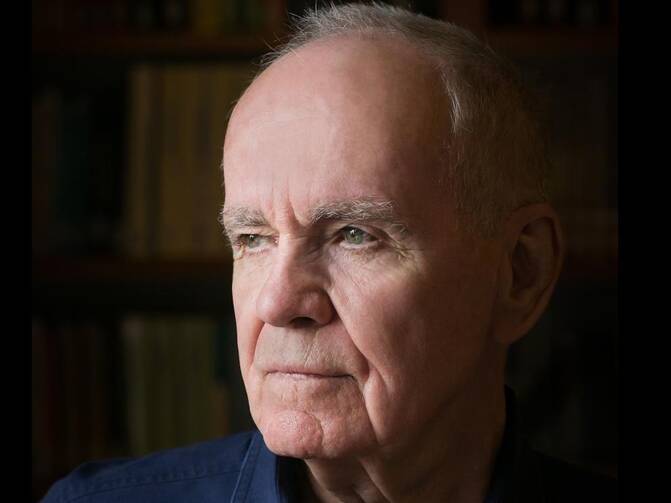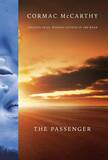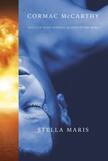Review: The return of Cormac McCarthy
Cormac McCarthy is 89 years old. He has outlived his idols, outlasted his contemporaries and lived long enough to find himself closer than just about any other serious American writer to being a household name. This fact goes a fair way toward explaining The Passenger and Stella Maris, his elegiac, disputatious and deeply odd pair of new novels.
McCarthy is the author of 12 novels, including Blood Meridian, Child of God and the National Book Award-winning All the Pretty Horses, as well as a handful of plays, scripts and short stories. Since winning the Pulitzer Prize for 2006’s The Road, he has published rarely, creating a sense of great expectation around these linked novels. Would they be a career summation? A judgment upon a changing society? One last horse ride into the sunset? Thankfully, McCarthy has always nursed a perverse streak, and the results are considerably stranger.
The Passenger opens on the image of a young woman in a white dress hanging from a tree in a wintry forest. Her name is Alicia Western, and her absence lingers throughout the novel, the greatest of a great many voids in the story. Her brother Bobby has become a salvage diver, and his grief over her has become a kind of permanent condition, a stasis from which he can never wake. When the reader meets him, he is living in 1980s New Orleans. An early-morning diving job to investigate a crashed JetStar private plane reveals a cabin that is one passenger short, and the flight log missing. Bobby’s suspicions quickly mount: No one saw the plane crash; no one could have seen it in the water; and no one could have opened the door before him, unless that person had come from the inside of the plane.
There was a sense of great expectation around these linked novels. Would they be a career summation? A judgment upon a changing society? One last horse ride into the sunset?
This sounds like the setup to another McCarthy potboiler, perhaps called No Country for Slightly Younger Men. For a while, The Passenger keeps up, introducing pairs of shadowy government agents, a mysterious death and the discovery of a rubber raft rolled up on an island off the coast. But McCarthy’s interests are elsewhere, and certainly not in plot. In a series of strikingly tender, talky chapters, he introduces the milieu of outcasts, petty criminals and gutter intellectuals through which Bobby drifts, ranging from the diabolically mellifluous (Long) John Sheddan to Debussy Fields, a trans woman whose journey toward reconciling her inner and outer selves McCarthy renders with surprising (given his age, anyway) generosity. He lays out the geography of dirty spoons and dive bars that made up the pre-gentrification city he drifted through as a young man. His characters drink a lot of wine, and eat a lot of lunch, and never come any closer to solving the novel’s inciting mystery.
Which is to say, The Passenger’s stasis mirrors Bobby’s own. The novel employs a chopped-up structure, slipping backward and forward in time without a clear destination. Every significant event seems to have happened before page one, from the invention of the atom bomb (Bobby’s father was a physicist at Los Alamos) to whatever conspiracy placed that plane in the bay. Like other McCarthy protagonists, Bobby doesn’t speak much about his inner life. We get memories of his childhood, his father and, in a particularly beautiful sequence, his sister’s performance of “Medea” in an old quarry in the Tennessee hills. But even this is remembered as pain. “I’m sorry. It’s all just darkness,” Bobby thinks. “I’m sorry.”
The novel is full of these vignettes. In one particularly unsettling chapter, Bobby takes a job on an oil derrick off the coast of Florida. But once he arrives, he finds the platform completely empty, and a storm bearing in. As he sits below decks, “the sound of the outer storm muted in the structure,” he becomes convinced that someone else is on the rig with him. A remnant of the crew? A member of the conspiracy? Bobby never figures it out. But McCarthy does not discount the possibility of another figure—one defined by its absence, the presence felt but never confirmed. That figure remains a void.
Bobby’s life includes many such voids, none greater than that left by his sister, who is the subject of the companion novel Stella Maris. Alicia was a mathematics prodigy—a gift, McCarthy strongly implies, left by the fallout of the atom bomb. She was also a paranoid schizophrenic. McCarthy opens nearly every chapter with an italicized incident from the girl’s short life, in which Alicia spars with a set of hallucinations she calls “horts” (as in “cohorts”).
One might distinguish McCarthy’s characters as Speakers and Interlocutors, those who talk and those who facilitate.
These hallucinations take the form of a troupe of vaudeville performers led by the Thalidomide Kid, a tiny, scarred man with cauliflower ears and flippers for hands. They intrude upon her sleep, rifle through her papers, perform moldy and out-of-date acts. Yet Alicia cannot say why they are coming to her. As she tells her psychiatrist in Stella Maris, “Each figure…all but shimmers with reality.” And how did they get here? Like everyone else, says the Kid. They rode the bus.
McCarthy has never been particularly interested in well-balanced debates; he prefers his conversations one-sided. In fact, one might distinguish McCarthy’s characters as Speakers and Interlocutors, those who talk and those who facilitate. Stella Maris is presented as a series of psychiatric evaluations between the young woman and a Dr. Cohen, but despite a few references to his personal life, the doctor never takes on real substance. It is Alicia who speaks at great length, discoursing on mathematical problems, the laws of music, the relationship of the unconscious to language and how it might feel to drown in Lake Tahoe.
What she will not talk about is Bobby. As becomes clear, Alicia and her brother were deeply in love, an unconsummated passion that Bobby cannot dismiss, even as his sister’s certainty disturbs him. Yet where he wavers, she acts. Stella Maris takes place across October 1972, the final autumn of Alicia’s life. Bobby is in a coma after a race car accident and seems unlikely to emerge. With her brother gone, Alicia sees no reason to live. This isn’t a recent urge. For a long time, she tells Dr. Cohen, she just did not want to be in the world. But with her soul’s love dead to the world, nothing remains for her to hold onto. That winter, she will commit suicide, and Bobby will wake up and not know what to do with his love, or with the listless life he is condemned to lead.
Some critics have described these novels as bleak, and there’s certainly some truth to that. After all, we’re dealing with the story of an impossible, incestuous love interrupted by suicide, while the presence of weapons that could destroy all life on earth thrums in the background. But I don’t think that McCarthy despairs over the human condition, and neither do his characters. There are too many other questions to answer.
Both novels dwindle down, easing inevitably deathward. All of us are headed there; McCarthy knows he is closer than most.
Throughout these novels, the Westerns speak at length about a series of mathematical and physical theories. McCarthy reportedly took great pains to render these ideas with the greatest accuracy, and I’ll have to defer to his presentation. In one initially odd chapter, Bobby reels off a list of various important 20th-century physicists to a writer in a leather jacket who then disappears entirely from the novel. As drama it’s awkward, and as education hopelessly obscure.
Yet on re-reading, McCarthy’s purpose clicked: All of these scientists sought to explain the fundamental basis of our reality, and yet few of their theories can be reconciled with one another. For McCarthy the modern condition is one of absolute uncertainty. Old systems, whether religious or scientific, have failed, but nothing has satisfactorily replaced them. Theories lead to other theories, conspiracies to further conspiracies without resolution. Our lives are pocked with unfillable voids. As Alicia says to her psychiatrist: “Just another mystery to add to the roster.”
To return then to McCarthy’s great age: The Passenger is filled with the sense of a life narrowing down and emptying out. As the novel progresses, the many colorful characters begin to disappear and die off, and the narrative comes to feel like an elegy for a city, an era and a way of life that McCarthy cannot find in the world anymore. Yet the effect is a great tenderness, even love.
In giving characters like Long John and Debussy plentiful page space, he allows them to speak for themselves, to extoll their personal philosophies in ways that contradict Bobby’s ambivalence and his author’s pessimism. Even McCarthy’s once grandiose prose has been whittled down into a series of evocative fragments, as if the author has grown skeptical of his own sentences. Perhaps he prefers to let life flourish in the gaps.
Both novels dwindle down, easing inevitably deathward. All of us are headed there; McCarthy knows he is closer than most. The Passenger leaves us with the image of a man persevering despite himself, outlasting his family and his friends for no clear purpose other than to hold onto the image of his love, a memory that will die with him but not yet, not yet.












